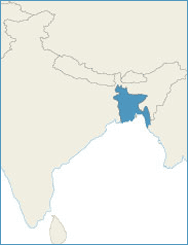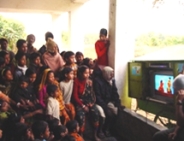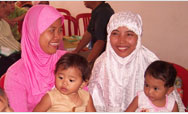 |
|
 |
 |
 |
| USAID Information:
External Links:
|
|
 |
 |
|
 |
 |
|
Bangladesh
SNAPSHOT
Date of independence: 1971
Capital: Dhaka
Population: 141.8 million
Annual income per person: $470
Source: World Bank Development Indicators 2005
USAID IN BANGLADESH
www.usaid.gov/bd/
CONTACTS
Denise Rollins
Mission Director
USAID/Bangladesh
Department of State
Washington, DC 20521-6120
Tel: 202-216-6326
Anne M. Dix
Bangladesh Desk Officer
Tel: (202) 712-5117
Email: adix@usaid.gov

Sesame Street television program teaches children pro-social behaviors besides literacy and numeracy. Because many areas do not have electricity or television broadcasting, USAID uses creative methods, including battery-powered televisions mounted on rickshaws, to reach children in rural areas. Overview
Bangladesh is a democratic and Muslim majority nation and an important ally of the United States. However, Bangladesh is one of the most densely populated and poorest countries in the world with low development indicators. U.S. interests in Bangladesh include a more stable democracy that respects human rights and combats trafficking in persons. The United States also seeks to reduce poverty and stem potential extremism.
Programs
Investing In People: Health and Education
USAID works with non-governmental organizations and the private sector to support technical assistance for selected public sector programs to expand family planning services and health care for the poor. USAID assisted programs serve one third of all couples using modern family planning methods. In 2006, USAID supported programs provided pregnancy related care to about 500,000 pregnant women mostly from poor households. By 2006, its programs reached 2 million people considered to be ‘most at risk for HIV/AIDS’ with HIV/AIDS prevention messages, counseling services and sexually transmitted infection treatment.
Although enrollment in primary school is estimated at 80 percent, in rural villages, enrollment can be as low as 20 percent. USAID’s pioneering work in early childhood education, including the support for 1800 pre-schools, improves school readiness to help address under-attendance, poor achievement and high dropout rates in primary school. Furthermore, USAID funded Sesame Street Television program “Sisimpur”, the most widely viewed children’s television program in Bangladesh, reaches over 7.5 million viewers weekly.
Economic Growth
Building on the success of its work to boost economic growth, USAID will place special emphasis on economic growth favoring poor, disadvantaged or at-risk groups, including women and youth. USAID will work to shrink the disparity in wages paid to men and women within targeted industries, expand access and participation for women in training programs and increase the number of woman-owned or managed businesses.
Electricity improves economic opportunities and quality of life. In 1971, only 3% of the population had electricity. Today 33% do. USAID’s most significant contribution has been to help bring energy to rural areas. In 2006, new rural connections averaged 2,500 per day, bringing the total number of rural connections to 7 million.
To protect natural resources, USAID works with communities to establish management systems that help use aquatic and tropical forest resources wisely and restore habitats and ecosystems. Almost 20,000 hectares in three major floodplains and 25,000 hectares of protected natural forest area are now under co-management. 80 fish sanctuaries have been established and fish production in targeted areas has increased 50 percent.
Governing Justly and Democratically
Large and small-scale corruption threatens the country’s progress and its resources. To fight this trend, USAID gets at the root of pervasive corruption by helping to improve fundamental governance issues, elections and political party development at the central level. USAID also works with NGOs, locally-elected governments and municipal associations to improve government accountability and the delivery of social services. These efforts led to direct budget allocations from the national government to local government associations for the first time ever and an increase of 50 percent in local revenues in targeted areas.
Peace and Security
With USAID’s support, the Bangladeshi government made significant progress in dealing with human trafficking, removing the country from prospective sanctions. USAID provided assistance to 390 women and children trafficking survivors during 2006.
Humanitarian Aid: Improving Preparation and Response to Disasters
Bangladesh suffers a major disaster every 6 years. The USAID assistance plays a transformative role by strengthening disaster preparedness activities at the community level. This assistance bridges gap between disaster response and development by supporting planning and preparedness in order to increase awareness and response capabilities of both local government and communities. In recent years, improved early warning and response systems have lessened the loss of life significantly. Contingency plans ensure that over 25 million vulnerable people have access to relief supplies within 72 hours of a disaster.
Back to Top ^
|


